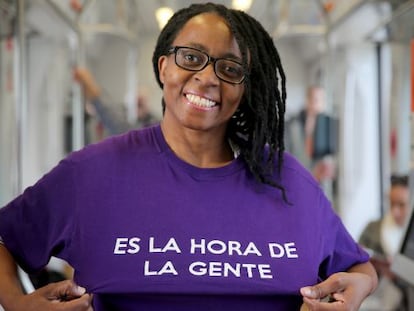Rita Bosaho: “We have to change the structure of the patriarchy”
Spain’s first black member of Congress outlines her priorities ahead of taking her seat

As the first black person to be elected to Spain’s Congress, Rita Bosaho says she is “overcome” by the media attention she has received over the last week. Born with Spanish nationality in Spain’s former African colony of Equatorial Guinea, she came to Spain at the age of four, and says she doesn’t consider herself an immigrant. But she accepts that she has become an important symbol, “and symbols are very important in our culture, in the same way the election of Barack Obama was important.” A former healthcare assistant at Alicante’s General Hospital, the 50-year-old chooses her words carefully when discussing politics, and is keen to avoid discussing her personal life.
The general elections were incredibly intense. We are just ordinary people who are trying to change this country’s institutions”
She left Guinea when she was four and was adopted by a Spanish family who brought her up in Alicante. Married, and with a 23-year-old son, she says her family has helped her deal with her new-found fame, which has even reached the international media. Her views on gender equality have led some commentators to dismiss her as a “feminazi.”
Question. You have a degree in history, and have worked in healthcare, so what made you go into politics?
Answer. For the last decade I have worked with a small NGO that sets up projects in Africa and Latin America. Six years ago I traveled to Guinea and I am interested in the problems people face on both sides of the shore.
Q. You describe yourself as a feminist.
A. Yes, because I believe the feminist struggle is political. Achieving equality should be a question of state. The day before voting I watched a film about Clara Campoamore [a Spanish politician and feminist]. We have to understand the price that has been paid for our achievements, and that in some areas we haven’t made as much progress as in others.
Q. But you are aware that the color of your skin has made you a very singular member of Congress.
A. Of course. Because this sends a message that we have to struggle for a world in which people who are not fully represented in society have a voice. We only have to see how our Gypsy brethren live, how Gypsy women live, who are as Spanish as everybody else, to understand how much still needs to be done.
Q. You have no previous experience in politics. How have you handled the two electoral campaigns of the last six months? [Bosaho was also a candidate for Podemos in the Valencian regional parliament]
A. The general elections were incredibly intense. We are just ordinary people who are trying to change this country’s institutions. For me it has meant a huge responsibility and it has been nerve wracking. I don’t have any experience in this. But I’m not bothered by it all, because two days before the campaign I was still working at the hospital. I have balanced my work with politics.
Q. How would you describe your relationship with Podemos chief Pablo Iglesias?
A. Very good. I suppose we know each other a little better now, but he is a very kind person, very approachable, and concerned about people’s problems.
This is a historic moment that we have to seize. We really can change the course of history”
Q. And with Mónica Oltra? Are you happy at how the alliance with her party, Compromís, has worked?
A. I think Mónica is a lovely person and a great politician. All this is helping to make women more visible, which is a good thing. The alliance has worked well. The agreement has been good for everybody and what’s more, it shows that we are able to dialogue, which we’re going to need to do. We have been able to reach agreement through long negotiations that have produced good results. My group is in the opposition in the Valencia regional parliament, but we have signed an agreement that will allow Compromís to govern there.
Q. Do you think Podemos’s result is the outcome of your campaign?
A. It has been a great campaign. We have really reached out to people, and the people have reached out to us. This is a historic moment that we have to seize. We really can change the course of history. What the politicians of this country need to do is to listen to people – right now they turn their backs on the people.
Q. What do you think are the most important issues in Alicante?
A. We have a serious problem with lack of funding in the region of Valencia. I am particularly worried about transport infrastructure. If we invested in transport as we should, the region would be a paradise. We have to invest in tourism, but we have to protect the environment, not like during the boom years of property development.
Q. How much of your party’s success is due to people’s anger with corruption?
A. It has been fundamental. It is an endemic problem with our system and we have to fight against it, as well as against the loss of social rights, the labor market reform, as well as finding more money for healthcare and women’s rights, particularly gender-specific violence.
Q. This is something you have mentioned many times during the campaign. What are we doing wrong in this regard?
A. There have been a lot of spending cuts. And when there are so many spending cuts in areas to do with working with people… It is not fair that more than half the population suffers more than the other half, shall we say, without accusing anybody in particular, and that our rights are not more visible. This has to do with patriarchal structures, and that means changes in education, cultural changes… We have to do something. Why are there no women running any of the main institutions in this country? There are continents such as Africa, which are very dependent on the money provided by women, and yet they aren’t represented in the institutions. This is a structural problem, a world problem. Why do girls make themselves look nice for their boyfriends? We have to feminize our society.
Tu suscripción se está usando en otro dispositivo
¿Quieres añadir otro usuario a tu suscripción?
Si continúas leyendo en este dispositivo, no se podrá leer en el otro.
FlechaTu suscripción se está usando en otro dispositivo y solo puedes acceder a EL PAÍS desde un dispositivo a la vez.
Si quieres compartir tu cuenta, cambia tu suscripción a la modalidad Premium, así podrás añadir otro usuario. Cada uno accederá con su propia cuenta de email, lo que os permitirá personalizar vuestra experiencia en EL PAÍS.
En el caso de no saber quién está usando tu cuenta, te recomendamos cambiar tu contraseña aquí.
Si decides continuar compartiendo tu cuenta, este mensaje se mostrará en tu dispositivo y en el de la otra persona que está usando tu cuenta de forma indefinida, afectando a tu experiencia de lectura. Puedes consultar aquí los términos y condiciones de la suscripción digital.









































